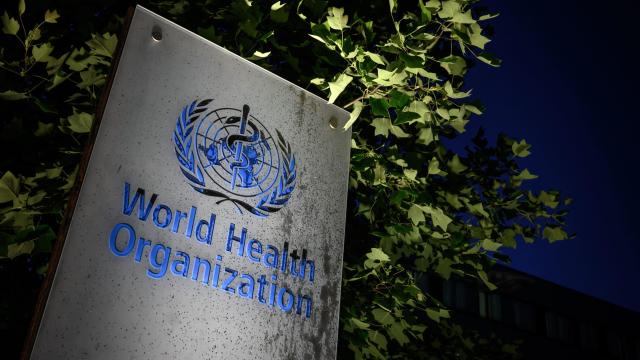On Friday, President Trump announced that the U.S. would immediately terminate its “relationship with the World Health Organisation” — the culmination of a threat that the administration issued a month earlier. It’s a decision, experts warn, that could have dire repercussions on efforts to keep people safe from the coronavirus pandemic and other global public health threats.
For starters, Trump’s announcement is likely to set off a confusing scramble as what exactly will happen next.
The WHO was established as part of an agreement signed by all country members of the United Nations following World War II, which included the U.S. Part of that agreement includes annual funding provided to the WHO from all UN members. For the last two years, the U.S. has given the WHO $US450 ($663) million annually, according to an analysis of the WHO’s funding conducted by NPR. That made the U.S. the single largest financial contributor to the WHO during that time, providing about 20 per cent of the organisation’s budget.
In mid-April, Trump said that he was temporarily cutting all funding to the WHO for the next 60 to 90 days, pending a White House review of the WHO’s role in managing the covid-19 pandemic. In mid-May, the administration sent off a letter to the WHO, accusing it of downplaying the initial reports of covid-19 in deference to China, and warned that it would permanently pull all funding unless the WHO made unspecified “substantial improvements” within the next 30 days. Less than 30 days later, on Friday, Trump said the U.S. would withdraw from the WHO and redirect its funds to “other worldwide and deserving urgent global public health needs.”
[referenced url=”https://gizmodo.com.au/2020/06/greece-will-open-to-international-tourists-but-ban-travellers-from-covid-19-hotspots-like-u-s/” thumb=”https://gizmodo.com.au/wp-content/uploads/2020/05/30/zzvju1llx0ogoj3y8log-300×168.jpg” title=”Greece Will Open to International Tourists but Ban Travellers From Covid-19 Hotspots Like U.S.” excerpt=”The Greek government announced today that it will open up to international tourists from 29 different countries on June 15, according to the English-language Greek news outlet Ekathimerini. People from countries with high infection rates for the coronavirus, including the U.S., UK, Sweden, Spain, and Brazil, will not be allowed…”]
But experts have disputed the idea that Trump can unilaterally revoke the country’s membership in the WHO or pull its funding for good without Congressional approval. It’s likely that any attempt to do so would be challenged by some members of Congress, which could drag into a legal battle. If it is possible for the U.S. to leave the WHO without Congress’s permission, the U.S. is apparently still mandated to pay the WHO any outstanding dues it has on its ledger, according to a legal analysis by Jean Galbraith, a professor at the University of Pennsylvania Law School, posted shortly before Trump’s announcement.
That said, even a temporary hold on U.S. funding to the WHO or a more informal fraying of the relationship could be disastrous.
“There are huge budgetary implications for WHO and its ability to provide emergency funding in the face of new pandemics,” Terry McGovern, director of the Program on Global Health Justice and Governance at the Columbia University Mailman School of Public Health, told Gizmodo via email.
The WHO certainly isn’t without its flaws, and it arguably made Ebola outbreak in Africa. With research efforts hopefully leading to new treatments and vaccines for covid-19, it will be those same countries that will need the most help gaining access to these likely very expensive drugs.
As McGovern has noted in the past, though, this isn’t the first time the Trump administration has shirked its role in helping global public health efforts. It previously stripped away funding from UN programs intended to provide reproductive health aid to women in developing countries, over objections that the money would cover abortion care. And the U.S. State Department has continued to try influencing the UN’s language guaranteeing women reproductive rights, even in the midst of the pandemic.
“The CDC has already begun cutting its international prevention efforts, so overall, this move will further isolate the U.S. and its public health leadership,” McGovern said.
That’s bad enough for the world’s most vulnerable people, but it also means that scientists in the U.S. will be fighting with one arm behind their back against covid-19 and future public health threats.
“We will lose vital information from the ground on new outbreaks, effective implementation of a response, etc,” she added. “And on a day-to-day basis, longstanding trusted relationships between the CDC, WHO, and local public health officials will be disrupted.”
Covid-19 highlights how illness respects no borders. While many living in the U.S. may think that disease outbreaks elsewhere don’t effect them, it’s largely thanks to WHO-coordinated efforts that germs like smallpox have been driven to extinction, while others like polio are on their way out. Without that same spirit of cooperation, it’s likely that the coronavirus will claim more lives than it should, Americans included.
